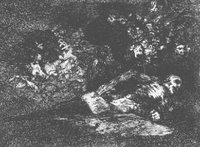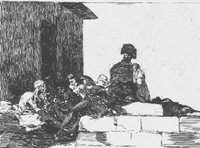Auster is interviewed regarding Brooklyn Follies on NPR. The chat
doesn't provide any startling revelations but it exudes an enthusiasm for the book that no review has yet generated for me. Auster's love for Brooklyn is known, but I'm somehow touched by the love he expresses for his characters.
Jason Boog talks about falling under the spell of Auster. In his preamble he notes, "Paul Auster can convince you that anything is true."
I've been watching a 1992 documentary on Auster (in French) that someone was kind enough to record for me. It's taking a long time to view the whole thing, as every few minutes Paul Auster says something interesting, so we have to pause and discuss baseball or pencils or to admire his hair, or Siri Huvstedt says something nasal and bloated, which we have to make fun of.
Auster on cramped surroundings: "The smaller it is, the bigger you have to make it in your mind, and then you find a way to perhaps transcend the place you're in."
Also, I've shown remarkable restraint (and perhaps stupidity) in not reading The Red Notebook. I have not opened it apart from the day I bought it, read a few snippets on the metro home, and tucked it into my purse. I have not since removed it from my purse, as I am intent on never being caught without reading material and so few books are exactly the right size. Of course, the content of it is charming too, filled with exactly the odd sorts of anecdotes that strangers might tell you in the metro.
The strange Mr Strange
I've been reading Susanna Clarke's Jonathan Strange & Mr Norrell (extract) for weeks now. There are several moody illustrations throughout, yet in one instance Clarke refers to the work of another artist, obviously recognizing that neither she nor her illustrator are up the task of painting this picture:
In Madrid the Spanish artist, Francisco Goya, made a sketch in red chalk of Jonathan Strange surrounded by the dead Neapolitans. In the picture Strange is seated on the ground. His gaze is cast down and his arms hang limp at his sides and his whole attitude speaks of helplessness and despair. The Neapolitans crowd around him; some are regarding him hungrily; others have expressions of supplication on their faces; one is putting out a tentative finger to stroke the back of his hair. It is, needless to say, quite different from any other portrait of Strange.


None of Goya's works matches this description, but his Disasters of War series certainly is highly evocative of the zombie-like horrors Clarke alludes to.
I have another 200 pages still to go, but barring some masterful literary trick yet to unfold or being at a complete loss for words on any other more interesting subject, I won't be saying more about this novel here. It's entertaining and is helping me procrastinate doing work and other projects, but it wouldn't bother me not to know how it ends. (Weird, that it wouldn't bother me.)
There is a curious magic about the book itself (let alone within the story it tells), it being at the right time for me, that it is handy to pick up at any moment but not so utterly engrossing that I cannot put it down, that I can follow the story for many pages while half my mind is puzzling over vocational and domestic dilemmas.
One of its effects is the curious sensation that I am occupying two worlds simultaneously.
I feel sleep-deprived this week, as if I've been staying up reading all night, which I haven't. My waking life is starting to resemble Lady Pole's.
The dream
Surrounded by "dream-familiar" strangers, my friends, in a bar. The place is abustle with conversation but nobody's actually talking out loud. Someone sits down beside me. I wake up with a most incredibly intense feeling of love, inner peace, understanding, peace with the world, everything's going to be ok. The feeling stays with me for a couple days, but it's starting to fade.
I rarely remember my dreams.
The phone call
Phone rings. "Hello." "Hello? Hello?" A woman's voice. Then distant but clear, a crossed wire, like a footnote, a man asks "Czy Pani mowi po polsku?" He's waiting for a reply. I'm about to give him one when the woman apologizes for dialing a wrong number and hangs up.
The bear
Getting Helena ready for bed we find someone's already in her bed. My 36-year-old teddy bear wearing Helena's brand new pyjamas. Although Helena herself put him to bed early because he wasn't feeling well, she's concerned now that there's nowhere for her to sleep, as well as nothing for her to wear.

She wakes me at 2 am to tell me she helped him take off the pyjamas because he was hot.


4 comments:
In your post, you sound like you're in that peculiar dreamlike place where the world's mystery is just out of reach. I don't know how to put it. But the surreal quality sounds familiar, it's like an itching at the back of the senses?
I liked your description of your reaction to Norrell and Strange. It is singular in its ability to transport you into another reality, and at the same time, to leave you unmoved in any meaningful way. I stuck with it all the way through, but I could have put it down and not been bothered as to the ending.
And what is the language the man spoke? Do you speak it? Was it a real phone call, or a dream?
Helena certainly knows how to care for your teddy bear when he's sick.
What was the man on the phone asking? I assume the language was Polish.
Dear Isabella,
Thanks for the link! I loved all the stories you layered into a single post. I wish more writers did that...
Cheers,
Jason Boog
I had a very similar experiance with "Jonathan Strange & Mr. Norrel". It took about 4 months to read - I started when my son was a month old - but I still kept getting all mixed up between the narrative and my life. Glad to know it wasn't just my post-partum weirdness!
Post a Comment